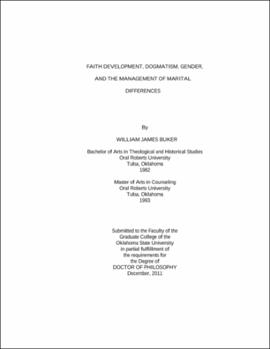| dc.contributor.advisor | Henry, Carolyn S. | |
| dc.contributor.author | Buker, William James | |
| dc.date.accessioned | 2013-12-10T18:04:16Z | |
| dc.date.available | 2013-12-10T18:04:16Z | |
| dc.date.issued | 2011-12 | |
| dc.identifier.uri | https://hdl.handle.net/11244/7694 | |
| dc.description.abstract | Scope and Method of Study: | |
| dc.description.abstract | This study examined the relationship between Bateson's (1972) concept of epistemology as applied to the conservative Christian mindset [approximated by Fowler's (1981) model of faith development and Altimeter's (2002) concept of dogmatism] and Guttmann's concept of marital conflict style (destructive v. constructive), which consisted of five dimensions (gridlock, startup, four horsemen, accepting influence, compromise). Data were collected from a convenience sample of 107 married individuals, 60 female and 47 male from local churches, mostly affiliated with the Charismatic or Pentecostal religious traditions, in an urban area of a southwestern state. A series of hierarchical multiple regression analyses were used to (a) examine the association of reports of faith development, dogmatism, and gender with overall marital conflict, including each of its five dimensions and (b) explore the possibility that dogmatism and gender moderated the association between faith development and marital conflict style and its five selected dimensions. | |
| dc.description.abstract | Findings and Conclusions: | |
| dc.description.abstract | Results of the series of hierarchical multiple regression equations revealed that faith development was negatively associated with overall marital conflict (destructive v. constructive) and two aspects of destructive marital conflict: harsh startup and gridlock. Gender differences were evident among some of the models, both directly (for harsh startup) and as a moderator of the association of faith development and overall marital conflict as well as two aspects of destructive conflict (harsh startup and gridlock). Specifically, the post hoc analyses showed that men who reported low faith development were more likely to perceive greater overall destructive conflict, especially harsh startup, and gridlock in their marital relationships, thus indicating that epistemology may be a factor in the perception of marital differences. | |
| dc.format | application/pdf | |
| dc.language | en_US | |
| dc.rights | Copyright is held by the author who has granted the Oklahoma State University Library the non-exclusive right to share this material in its institutional repository. Contact Digital Library Services at lib-dls@okstate.edu or 405-744-9161 for the permission policy on the use, reproduction or distribution of this material. | |
| dc.title | Faith development, dogmatism, gender, and the management of marital differences | |
| dc.contributor.committeeMember | Hirschlein, Beulah M. | |
| dc.contributor.committeeMember | Shreffler, Karina | |
| dc.contributor.committeeMember | Perry, Katye M. | |
| osu.filename | Buker_okstate_0664D_11827 | |
| osu.accesstype | Open Access | |
| dc.type.genre | Dissertation | |
| dc.type.material | Text | |
| dc.subject.keywords | epistemology | |
| dc.subject.keywords | faith development | |
| dc.subject.keywords | gender | |
| dc.subject.keywords | marital conflict | |
| dc.subject.keywords | marital differences | |
| dc.subject.keywords | systems theory | |
| thesis.degree.discipline | Human Development and Family Science | |
| thesis.degree.grantor | Oklahoma State University | |
